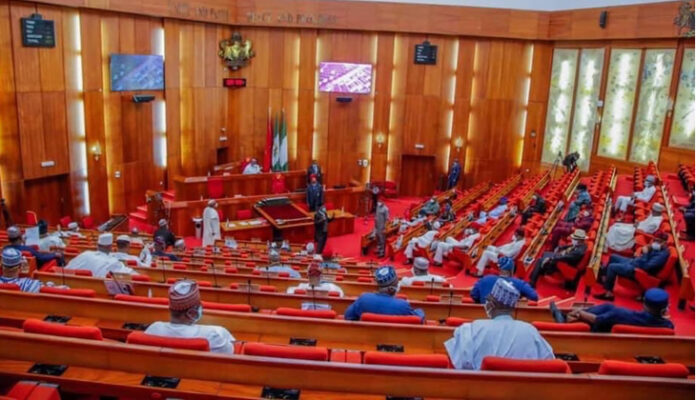Senate To Ban Local FX Transactions, Proposes Jail Term
A bill that seeks to bar a serving Governor of the Central Bank of Nigeria from partisan politics and equally reposition the bank for efficiency, scaled second reading in the Senate on Wednesday.
A second bill, seeking to prohibit the use of foreign currencies for local transactions was also considered.
One of the consolidated bills, titled: “Central Bank of Nigeria (Establishment) (Amendment) Bill 2023,” was sponsored by Senator Steve Karimi (All Progressives Congress – Kogi West) while the second one, titled: “A Bill to Amend the Central Bank of Nigeria Act 2007, and for Matters Connected Therewith, 2023,” was sponsored by Senator Darlington Nwokocha (Labour Party – Abia Central).
Recall that the immediate-past CBN governor, Godwin Emefiele, attempted to contest the 2023 presidential primaries of the APC while in office.
The move was widely condemned by Nigerians who wondered how a serving public servant could seek an elective office contrary to extant provisions of the constitution.
Karimi explained, in the explanatory memorandum of his bill, that the proposed legislation was aimed at amending the CBN Act to allow for greater accountability and transparency in the running of the apex bank and to prohibit the use of foreign currency in local transactions in Nigeria.
Karimi’s proposed amendment to Section 9(2) of the CBN Act reads: “Notwithstanding the provisions of this Act or any written law in existence, the Governor and the Deputy Governor of the bank shall not participate directly or indirectly in partisan politics, nor contest any election, during their tenure in office.”
The Kogi West lawmaker’s bill also seeks to prohibit the use of foreign currency for domestic transactions in Nigeria.
The bill seeks an amendment to Section 20 of the CBN Act, by inserting Section 20(a).
The proposed amendment reads: “20(a) Prohibition of the use of foreign currency in democratic transactions:
“(1) No person or corporate body shall use any foreign currency as a means of exchange for goods, services and other transactions in markets supermarkets, hotels, restaurants, airports and other places of business in Nigeria except by a bank.
“Licensed Bureau De Change and other financial institutions duly authorised by the Central Bank of Nigeria to trade, deal and use such currency and no individual or business entity in Nigeia shall advertise, denominate or price its goods or services in any currency other than the Nigerian Naira and Kobo.
“(2) Any person who contravenes subsection (1) of this section commits an offence and shall be liable on conviction to: (a) in the case of an individual, to a fine of N250,000.00 or a term of imprisonment, not exceeding six months or both such fine and imprisonment;
“(b) in the case of a corporate entity to a fine of N1,000,000 and a conviction of three months to its officers or directors who authorised or undertook the transaction.”
On his part, Senator Nwokocha, in his lead debate, said, “This bill seeks to address all anomalies that have hindered the advancement of the apex bank to handle the ailing economy of our nation.
“The thrust of this amendment is to create a people-centered Central Bank by delivering price and financial system stability and promoting sustainable economic development.
“As the nation grapples with economic issues, we need to reposition the CBN to grow the economy, regulate the exchange rate, and unauthorise financial transactions and dollarising the economy.
“This bill seeks to, among other things, separate the head of management from the head of the governing board in line with national and international good corporate governance practices.
“Enshrine real-time controls and effective accountability in the conduct of central banking in Nigeria
“Reposition the CBN towards pursuit and advancement of its core mandates given the Bank’s pivotal role in the economy; and position the CBN as an apolitical entity that will become a worthy example in national and international monetary policy, banking sector regulation, currency management, and supervision.”




